Sometimes at BookNotes I want to go into detail telling you a lot about a great book. Sometimes, like here in early March, we have so many incoming titles that I want to let you know about that I’m just going to announce most of them pretty quickly. I’ll try to be brief, but we’ll see. A few I have to explain, so it’ll take a few paragraphs. In any case, they are all 20% off and we’d be grateful to help you out if you want any of them. Gotta keep up, ya know. Busy as we are, reading is a crucial discipline and a great joy. Do it!
Depending on the device on which you are reading this you may have to scroll down to see to the very end of the column. And that’s where the links are to order. Click those buttons at the end to either inquire or to actually order. We’re here and eager to serve. Thanks.
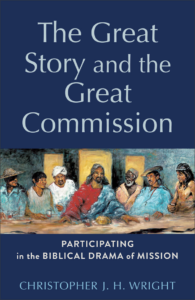 The Great Story and the Great Commission: Participating in the Biblical Drama of Mission Christopher J.H. Wright (Baker Academic) $23.99 OUR SALE PRICE = $19.19
The Great Story and the Great Commission: Participating in the Biblical Drama of Mission Christopher J.H. Wright (Baker Academic) $23.99 OUR SALE PRICE = $19.19
I announced this quickly a bit ago, but it is so new, and so important, and from what I can tell from a quick skim, so fresh and imaginative, that it simply must be mentioned again. How we read the Bible matters, and seeing the unfolding drama that offers a trajectory of ultimate healing and wholeness for all creation is essential. If you love the Bible, if you are glad to be following Jesus the King, if you care about the relevance of faith in the modern world, this work bringing the Bible’s big story to life and thereby reframing the concept of mission is for you.
As Mike Goheen puts it, “Wright continues to produce important books for the church.” Right!
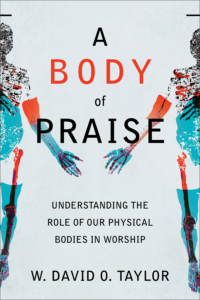 A Body of Praise: Understanding the Role of Our Physical Bodies in Worship W. David O. Taylor (Baker Academic) $26.99 OUR SALE PRICE = $21.59
A Body of Praise: Understanding the Role of Our Physical Bodies in Worship W. David O. Taylor (Baker Academic) $26.99 OUR SALE PRICE = $21.59
Another remarkable book out of Fuller Theological Seminary with their study of theology and culture — amazing! I respect David Taylor so much (besides being a scholar and prof, he’s an art critic and priest He’s also the guy who did that great video documentary with Eugene Peterson and Bono talking together about the Psalms.) I know there have been other books that have approached this in Catholic scholarship, within mainline Protestant circles, and some evangelicals. But I do not know of anything that looks this good, this nuanced, this solid and passionate. Blurbs on the back include ravens from Rowan Williams, Constance Cherry, Joel Scandrett, Simon Chan, Beth Feller Jones and more.
As Taylor creatively argues, within the context of worship “there is something for our physical bodies to do that decisively forms Christlikeness in us.” A Body of Praise is, before pages of fascinating footnotes, about 160 pages. You should do this!
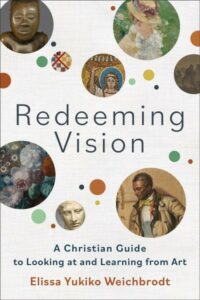 Redeeming Vision: A Christian Guide to Looking at and Learning from Art Elissa Yukiko Weichbrodt (Baker Academic) $29.99 OUR SALE PRICE = $23.00
Redeeming Vision: A Christian Guide to Looking at and Learning from Art Elissa Yukiko Weichbrodt (Baker Academic) $29.99 OUR SALE PRICE = $23.00
If you were following our social media output during Jubilee a month ago you maybe saw a photo of this book, the first spotted edition out there in the book wilds, posted by a friend of the author who was browsing our huge arts section there. We were so thrilled (and learned that the author, from Covenant College in Tennessee, was near us here in central PA that weekend, visiting with the Square Halo Books folks at their own event with poet Malcolm Guite.) Small world.
Here’s what I’ll say quickly: Elissa is a rising rock star, a great teacher and a very good writer. This book is exquisitely produced and, yes, it cites Calvin Seerveld. His Rainbows for the Fallen World and Bearing Fresh Olive Leaves are plumb line items; if a book on aesthetics doesn’t cite them, I know something is missing, maybe off. In any case, she’s on top of her game, thinking Christianly and delightfully helping us all see what we should, and explaining happily why it all matters. As Bruce Herman puts it, “Redeeming Vision is an erudite and yet wonderfully hospitable invitation…”
Weichbrodt, as another reviewer puts it, provides “a useful toolbox of interpretive tools and frameworks for faithful and generative engagement with a great diversity of artworks.” Look: we are formed by the images we view and (as it says on the back cover) “from classical art to advertisements and from news photos to social media, the images we look at mold our ideas of race, gender, and class. They shape how we love God and our neighbor.” Hallelujah!
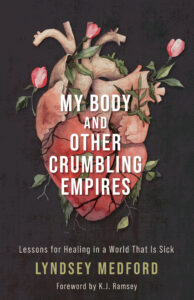 My Body and Other Crumbling Empires: Lessons for Healing in a World That is Sick Lyndsey Medford (Broadleaf) $26.99
My Body and Other Crumbling Empires: Lessons for Healing in a World That is Sick Lyndsey Medford (Broadleaf) $26.99
OUR SALE PRICE = $21.59
What an allusive title and cover. There have been lots of books coming out in recent years about the nature of the human body (some astutely theological) and about our many chronic illnesses and autoimmune disorders and painful conditions. I am glad for them, helping us to (in the words of Marva Dawn in her splendid book from years ago) “being sick well.” My Body… looks to be exceptionally profound, mature, prophetic, even. The great Shannan Martin says it offers a deft mix of “gentleness and fire.”
K.J. Ramsey wrote the forward and her three books are all exquisite and solid. Her introduction to this new book is very, very good. I’m glad the two women are connected.
Our friend J. Nichole Morgan, author of Fat and Faithful, says about it,
Medford weaves through the ways our lives are pushed and pulled in a system that is not set up to teach us to have a relationship with our body, just to conquer and tame it. She reminds us that self-care without community care, without centering and acknowledging those who are marginalized, misses the bigger picture. I highly recommend this beautiful guide to living in a body.
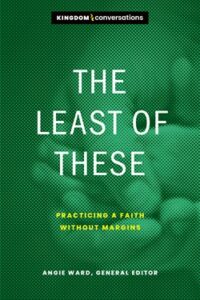 The Least of These: Practicing a Faith without Margins edited by Angie Ward (NavPress) $16.99 OUR SALE PRICE = $13.59
The Least of These: Practicing a Faith without Margins edited by Angie Ward (NavPress) $16.99 OUR SALE PRICE = $13.59
This brand new paperback is the third in Missio Alliance’s “Kingdom Conversations” series. We shared about the others (When the Universe Cracks and Kingdom and Country) and one adopts the same good format. There are edgy evangelical authors, multi-ethnic, missional and wholistic, Kingdom people, weighing in on various aspects of the topic. In this case there is a wide range of topics (and in this sense it reminds me a bit of the important recent book by Shane Claiborne Rethinking Life which offers a consistent ethic of life.)
In this fascinating discussion we have Dennis Edwards and Danielle Strickland, Aubrey Sampson and Christian Rice. Lisa Rodriguez-Watson asks “Who Is My Neighbor?” And David Hionides we are “Created in His Image.” Brandon Washington offers a “Comprehensive Gospel.” There is a chapter on “multi-ability” and a wonderful piece on being people of “(Glad) Hope.” Very nicely done.
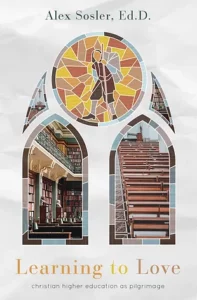 Learning to Love: Christian Higher Education as Pilgrimage Alex Sosler (Falls City Press) $18.99 OUR SALE PRICE = $15.19
Learning to Love: Christian Higher Education as Pilgrimage Alex Sosler (Falls City Press) $18.99 OUR SALE PRICE = $15.19
Okay, I love this book. I love it! Sosler is a customer (and I helped a tiny bit with some of the editing of this one.) You may know we have a bunch of books about higher education, about reforming college education, especially about the small but important topic of distinctively Christian higher ed. As an alum of the Higher Education Degree program at Geneva College, how could we not? We have a number of BookNotes readers who do campus ministry, too, so caring about the context of higher learning is vital. Anyway, this new volume is a gem, and, believe me, we’ve read a number of similar sorts of books.
Granted, this is pitched to students going to a Christian College. Dr. Sosler is himself a professor at Montreat College in the Black Mountains of NC. (He is also an Assisting Priest at an Anglican Church in Asheville NC.) But I truly believe that it would be of use to anyone going off to college in any sort of school. It is, to be clear, an invitation to think about college as a time and place to grow in God’s grace and love. It is, oddly, still a bit radical to invite kids to ask “why go to college?” To ask all involved “what is the purpose of college” is urgent. Students are often bored and disinterested because they’ve never been given a vision of education worth pursuing with much vigor. As it says on the back properly, “In Learning to Love, Alex Sosler provides a rich vision of higher education by rooting education in love and affection.” (Yep, they are swiping that word from Wendell Berry — it all turns on affection, as he puts it — and is influenced by Jamie Smith’s (post-modern) Augustinian reflections.)
Sosler quotes the wonderful Esther Lightcap Meek who teaches (in books like Longing to Know) that we love in order to know. And we know by loving well, appropriately. If words like joy and longing, desire and hope, renewal and human flourishing aren’t on the tongue of your young adult, buy them this book. College should help them become the kind of people who think and talk in these terms, who want to study in order to grow in charity and wonder, wisdom and service. I know that isn’t what their guidance counselor said. Most likely their church didn’t say much at all about the reason for going to college. The book is winsome and chatty but truly profound, saying things that somebody must say. I think your young adult friends will like it and, in time, they will thank you. Kudos.
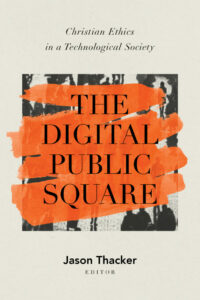 The Digital Public Square: Christian Ethics in a Technological Society edited by Jason Thacker (B+H) $34.99 OUR SALE PRICE = $27.99
The Digital Public Square: Christian Ethics in a Technological Society edited by Jason Thacker (B+H) $34.99 OUR SALE PRICE = $27.99
There are plenty of books about being responsible and ethical and wise in using technology. I’ve raved here about titles like The Tech Wise Family by Andy Crouch and his richer, more eloquent The Life We’re Looking For — a must read, I’d say! Thacker himself has done the prescient The Age of AI: Artificial Intelligence and the Future of Humanity in 2020 and just a year ago released the small sized, potent, Following Jesus in the Digital Age. Here he has edited a volume of serious folks thinking about what Matthew Kaemingk (in his back cover blurb) calls “the principalities and powers of the digital public square.”
This big book offers a “constructive public theology that can guide that engagement.” From public issues and policy questions from online censorship to hate speech, religious freedom questions to sexual ethics, various scholars (from David French to Bonnie Kristian, Patrica Shaw, Keith Plummer and many others) weigh in with the best collection of such work I’ve yet seen. Other blurbs on the back are from Dru Johnson, Ben Sasse, Russell Moore. This is surprisingly rich, thoughtful, weighty, even. Wow.
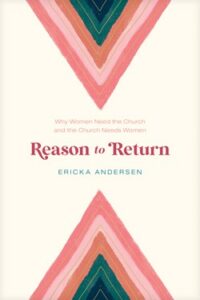 Reason to Return: Why Women Need the Church and the Church Needs Women Ericka Andersen (NavPress) $16.99 OUR SALE PRICE = $13.59
Reason to Return: Why Women Need the Church and the Church Needs Women Ericka Andersen (NavPress) $16.99 OUR SALE PRICE = $13.59
A while ago I noticed — not surprisingly, I suppose — a number of books that were specifically about women’s experience of the church. Not just about abuse and toxic relationships with patriarchal structures in some denominations, but more broadly. There have been several books like that over the decades, understandably so. But with titles like Prey Tell: Why We Silence Women Who Tell the Truth by Tiffany Bluhm (Brazos) or the academic The Struggle to Stay: Why Single Evangelical Women Are Leaving the Church by Katie Gaddini (Columbia University Press) or Buried Talents: Overcoming Gendered Socialization to Answer God’s Call by Sean Harris Howell (IVP Academic) it was obvious that more attention was finally being paid within the publishing world to tell these kinds of stories.
Ericka Andersen (host of the popular Worth Your Time podcast) has written in important venues such as The New York Times, The Wall Street Journal, Christianity Today and World. She has had her eye on this stuff for years.
Many women have a complicated relationship with the Church. As it says on the back cover, “Statistics show that women are leaving their churches in droves. Although these women desire a close relationship with God, the imperfect churches of their paste hinder them from having their deep spiritual longing met today.”
Of course, that’s the back cover copy. Her writing is more glowing and more nuanced. But she does explore deeply the many reasons why many women are leaving their local congregations. She offers thoughtful analysis and gentle insights. She offers lots of stories, and tells some of her own. I think many will appreciate her candor. She invites women who have left the church to “rediscover an important piece of their faith that has been missing.”
I don’t know why some have drifted from faith communities (although I sure know that if one is not respected or able to serve well in a overly authoritarian church there are plenty of others to try that will gladly welcome your gifts.) If it is apathy or the pandemic or past hurts, this book may help. She holds out hope that the church of your past does not have to be the church of your future. Sound good?
My friend Traci Rhodes, a spiritually ecumenical and happily wandering/wondering writer who knows a thing or two about all of this says:
Church is always and forever both highly personal and highly communal. In this book, Andersen boldly encourages us to keep asking Jesus for the right church balance in our lives. I found her arguments for being in church both convincing and encouraging. Traci Rhoades, author of Not All Who Wander (Spiritually) Are Lost and Shaky Ground: What To Do After the Bottom Drops Out
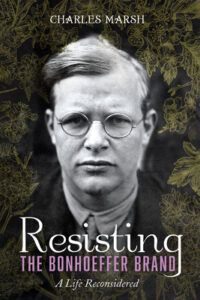 Resisting the Bonhoeffer Brand – A Life Reconsidered Charles Marsh (Cascade) $14.00 OUR SALE PRICE = $11.20
Resisting the Bonhoeffer Brand – A Life Reconsidered Charles Marsh (Cascade) $14.00 OUR SALE PRICE = $11.20
I read this short book in one long sitting and I am still pondering it, glad for this intellectual exercise, despite the awful cover typography and design. Who doesn’t want to know more about Bonhoeffer and how to apply his courageous faith and writing to our lives today? This isn’t a typical Bonhoeffer study, so you may not need it, but I couldn’t put it down. I love nerdy footnotes and this one wins the award — some of the lengthy footnotes cite articles in German! Whew. I have said that I’d read anything Charles Marsh writes and this one didn’t disappoint.
Here’s the backstory. Years ago Charles wrote one of the most engaging books on Bonhoeffer that has yet been done, the creative and energetic (and very well informed) biography Strange Glory: A Life of Dietrich Bonhoeffer. It came out a few years after Eric Metaxas’s best-selling Bonhoeffer: Pastor, Martyr, Prophet, Spy.
I’ll admit I liked and defended most of Eric Metaxas’s Bonhoeffer and was glad so many read it. (Before that, the standard bio was one that was bone dry, and Eric’s was, at least, engaging and captivating and full of evangelical inspiration, even if some in Bonhoeffer scholarship circles hated it.) It seems that Charles (who had done his PhD thesis on Bonhoeffer, but was known for writing brilliantly about civil rights stuff) didn’t appreciate some of Metaxas’s speculations and tone. (This was before Eric went off the deep end into a bizarre Trumpian cult and conspiracy stuff.) So Marsh finally wrote the long-awaited Strange Glory.
Alas, some in the guild didn’t like it. They thought he was pushy, speculative, inappropriate. (Especially in suggesting that Dietrich had a homosexual relationship with his colleague Eberhard Bethge.) A German scholar named Ferdinand Schlingensiepen was especially critical of Marsh’s methods and content and he raged quite fiercely on both sides of the Atlantic.
Three things quickly happen in Resisting the Bonhoeffer Brand. First, right out of the gate, we realize that there are general methodological principles to be considered and Marsh cites a handful of literary critics and artists and writers about the process of doing biography. How do stories get told? Who interprets whom and based upon what data? What is the relationship between the teachings of a person and their life, their character? Exploring that is a huge matter but in a few pages and a few well placed quotes, Marsh raises foundational questions about literary criticism and writing and storytelling and the art of biography. I loved the section called “Theology and Biography” even though I had to read a few sections twice.
Secondly, we learn still more about Bonhoeffer, filling in some stuff that you might not recall, even if you’ve read a few biographies or articles. When critics say this or that about Marsh’s telling in Strange Glory he pushes back, documenting why he wrote what he did, appealing to the research he has done on primary sources, on location, which is to say, Bonhoeffer’s life and times. For instance, he makes a compelling case just how passionate Bonhoeffer was during a season in Barcelona. That season is actually discussed a lot in the Bonny academic literature, but Charles reports from the Spanish field by studying the sermons Bonhoeffer actually preached there. In a few pages a whole lot came into view.
Thirdly — and this is the heart of the book, I suppose — he replies to his critics, argues back, takes exception, and doesn’t back down. (Oh, there’s a few errors in Strange Glory which he quickly concedes, like calling a place a “hunting lodge” rather than a “foster’s lodge.” He called one historic German city Chamby, not Chambry. Got it. His mea culpa is sincere, but it also sort of sets the stage for the fight to come: he doesn’t say that Schlingensiepen is a jackass, but, geesh.)
And so it goes, page by page, topic by topic, accusation and rebuttal. It’s informative and fascinating, if a little bit odd. Whose life is being “reconsidered” here? Bonhoeffer’s, of course. But the two authors, too, perhaps. If only they could have just chatted over a good German brew and schwarzwälder kirschtorte.
Even if the conversation could have been more congenial, Marsh contends that “Bonhoeffer scholarship desperately needs the revitalizing energies of the theologian’s life story revisited and uncensored.” And he’s right about that. Which is why Heath Carter of Princeton says, “Charles Marsh’s latest book is essential.”
Here is an endorsement by a sharpt pastor-writer-leader I deeply respect, Winn Collier, biographer of Eugene Peterson:
Bonhoeffer warned against being infatuated with a self-made idea about Christian community but not loving the actual community as it is: gritty and human, complex and wondrous. What a turn then — now we need Marsh to offer the same warnings about how we read Bonhoeffer himself. We like our saints to fit tidy boxes and rubber-stamp our presumptions. Marsh, with his historian’s eye and novelist’s pen, won’t let us make this mistake. — Winn Collier, Western Theological Seminary
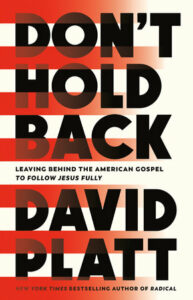 Don’t Hold Back: Leaving Behind the American Gospel to Follow Jesus Fully David Platt (Multnomah) $25.00 OUR SALE PRICE = $20.00
Don’t Hold Back: Leaving Behind the American Gospel to Follow Jesus Fully David Platt (Multnomah) $25.00 OUR SALE PRICE = $20.00
You may recall Platt’s book a decade ago, Radical, which invited gospel-centered, mission-minded evangelicals to focus less on the American dream and more on the cost of commitment. It created quite a stir —even though not that radical for those who grew up reading Ron Sider or Jim Wallis or Dorothy Day — and even made it into a quick scene to the popular TV show Madam Secretary. It was fine, and he was a serious-minded preacher.
Alas, he took a call to a large well-known, conservatively evangelical church near Washington DC and in no time at all he was being criticized. He was straight as could be on the hot button issues that most evangelicals care about but something about his passion for outreach, for meeting people where they are at, as we used to say, for grace and justice and kindness didn’t sit well. It has been a hard road, there for him.
Don’t Hold Back is his report back, Radical more than tens years later, wondering what it means to renounce the idols of the age in order to be a faithful evangelical in North America. He calls us to “leverage our lives” and to “rectify the great imbalance.” He’s hard on what he calls “the American gospel” but is boldly Christ-centered and conventionally Biblical, exhorting us to seek God through Scripture with intensity and boldness.
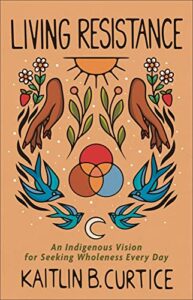 Living Resistance: An Indigenous Vision for Seeking Wholeness Every Day Kaitlin B. Curtice (Brazos Press) $21.99 OUR SALE PRICE = $17.59
Living Resistance: An Indigenous Vision for Seeking Wholeness Every Day Kaitlin B. Curtice (Brazos Press) $21.99 OUR SALE PRICE = $17.59
I would very much like to write more about this but I am only part-way through it. I am sure you know Kaitlin Curtice from her lovely Glory Happens published by Paraclete and her indigenous vision, Native, that came out a few years ago from Brazos. Here she is reflecting on how as a native woman she has learned just how important the language of resistance is. She says it is our basic human calling and we each have a role to play. I appreciate her very much.
She describes four “realms” of resistance — personal/inward; communal, which entails social reform work; ancestral (exploring one’s roots); and what she calls integral (resistance that involves all parts of the self).
If it helps you place it a bit, this timely call to a socially aware and principled spiritual life is endorsed by Glennon Doyle (who calls it a “lifeline”) and Rev. Dr Jacqui Lewis who says she “fiercely and gently calls us home…” Rabbi Tanya Ruttenberg says it “forges a path to a more whole now and a more whole tomorrow.” Impressively, Latinx poet and storyteller Joel Leon says it is a “clear and beautiful path that feels accessible to all.”
Asha Frost (an indigenous medicine woman and bestselling author of You Are the Medicine) says it “reminds us of a fire we hold in our bellies and the spark we carry in our souls.”
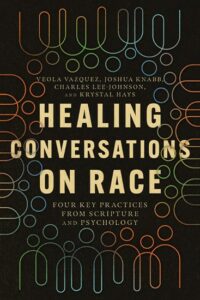 Healing Conversations on Race: Four Key Practices From Scripture and Psychology Veola Vazquez, Joshua Knabb, Charles Lee-Johnson, and Krystal Hays (IVP Academic) $24.00 OUR SALE PRICE = $19.20
Healing Conversations on Race: Four Key Practices From Scripture and Psychology Veola Vazquez, Joshua Knabb, Charles Lee-Johnson, and Krystal Hays (IVP Academic) $24.00 OUR SALE PRICE = $19.20
This is another gem that I should write more about — it’s very impressive. There are bunches of books on racial justice and truly helpful and fruitfully honest conversations these days. This publisher, IVP and IVP Academic, has done excellent ones for many decades now. So this has integrity, vetted as it is, and emerging from a thoughtfully evangelical worldview. The authors are young scholars, all colleagues in the College of Behavior and Social Sciences at California Baptist University.
Race complicates our relationships, even when we reject racism and seek to walk a better path together. They are offering this research to see how we can get our thinking (and our conversing) “unstuck from entrenched patterns.” They are a team of experts in psychology and social work, so know social realities well. They interpret things in light of the grand narrative of Scripture, of course, and they do this well. But their genius is also in their Biblically-guided insights about social psychology and solid science which can help us learn skills to better discuss ethnicity. From attachment theory to specific relational skills, Healing Conversations offers much. Highly recommended.
 Hope for American Evangelicals: A Missionary Perspective on Restoring Our Broken House Matthew Bennett (B+H) $17.99 OUR SALE PRICE = $14.39
Hope for American Evangelicals: A Missionary Perspective on Restoring Our Broken House Matthew Bennett (B+H) $17.99 OUR SALE PRICE = $14.39
This book is easy to describe and it will be fascinating for many of our customers, I’m sure. Here’s the thing: one need not be a card carrying evangelical to appreciate much of this. And, in fact, I think he is wrong and/or shallow about a number of important topics, and I am less than thrilled with a few lines here and there. But, no matter: this book is a major contribution that needs to be discussed because it is almost exclusively one man’s interpretation of the vast body of work by the great missional thinker Lesslie Newbigin. As such, it’s really a great read.
A Church of Scotland missionary to India for most of his adult lifetime, Newbigin has quite a story and I won’t rehearse it here, other than to say he is a key figure in the broader body of Christ, respected and even revered (if sometimes fiercely debated) in mainline denominational settings, Reformed and Catholic and Lutheran and more, and within missional and evangelical circles. This author, Matthew Bennett — with a PhD from Southeastern Baptist Theological Seminary — was a cross-cultural missionary in North Africa and the Middle East and came back to teach missiology at an evangelical college and, perhaps like his hero Newbigin, was shocked by how things had developed in his homeland. And applied what he learned as a missionary to our post-Christian culture, here, now.
Bennett loves his evangelical tradition, the conservative values, what he sees as a Biblical approach, but, yet, this home needs some serious touching up and renovation. He goes “room by room” looking at what Newbigin’s insights might offer as we address so many aspects of our congregational and theological lives. Consider this an intro to how Newbigin’s work might be applied today, even if you are not convinced this telling gets it fully right. What a fabulous and provocative little book!
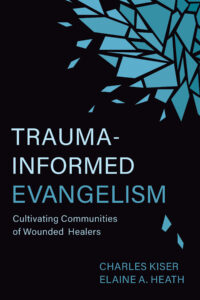 Trauma-Informed Evangelism: Cultivating Communities of Wounded Healers Charles Kiser & Elaine Heath (Eerdmans) $19.99 OUR SALE PRICE = $15.99
Trauma-Informed Evangelism: Cultivating Communities of Wounded Healers Charles Kiser & Elaine Heath (Eerdmans) $19.99 OUR SALE PRICE = $15.99
This just arrived and I am very eager to study it more. The first chapters were very captivating to me with Kiser telling his story about doing a church plant in a hip neighborhood in Dallas and coming to painfully realize just how much hurt and resistance there was to the church. Heath, an author of many good books, was his teacher at Duke and together they establish how toxic theology can wound and how bad evangelism has turned so many off.
I have some concerns these days about how many people are using the word trauma, as if it is any bad feeling or comes from any hurtful experience. This is not to deny that there really is trauma and that we desperately need “trauma informed” practices, but I worry about being cavalier or glib.
Trauma-Informed Evangelism, I am confident, is not simplistic about trauma studies nor is it overstating the severe woundedness experienced by some from church folks. Given that, how do we talk about faith, what witness do we bear? As Tiffany Yecke Brooks (author of the intriguing Gaslighted by God) says, “it is not enough to merely apologize for harm done in the name of Christ; we must work to change our own behaviors, attitudes and practices.” This book, she says, will help.
It is for anyone who cares about doing effective ministry in this cultural moment when so many are becoming more and more aware of abuse, wounds, privileges and slights, some of which lead to religiously-caused trauma. Heath, by the way, wrote a fascinating book several years back called The Mystic Way of Evangelism so crafting new ways to think about our calling to share the gospel and be agents of good news isn’t new for her. The guidelines here should be helpful. Let’s at least talk about it, shall we? It is urgent.
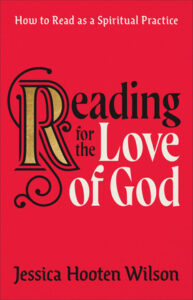 Reading for the Love of God: How to Read as Spiritual Practice Jessica Hooten Wilson (Brazos Press) $24.99 OUR SALE PRICE = $19.99
Reading for the Love of God: How to Read as Spiritual Practice Jessica Hooten Wilson (Brazos Press) $24.99 OUR SALE PRICE = $19.99
We highlighted this almost a half a year ago at BookNotes and took some pre-orders and now we are very glad to announce that we have it in stock and are happy to send more. Believe me, if you are a book lover, a reader, a hobbyist or scholar, you are going to want to get your hands and eyes on this as soon as possible. It is brilliant, wonderful, useful, wise, and fun.
I speak and teach on this kind of stuff a lot and while I bring different strategies, use some different Biblical texts, cite other authors and storytellers, our vision is similar and our hope to motivate better, wiser reading among people of faith is strong. In the first chapter, here, Jessica asks “What kind of reader are you?” It is a great question.
Hooten Wilson is a scholar of these things so she goes deep. The book is more serious in tone and more dense than our much-touted The Pastor’s Bookshelf by Austin Carty that we raved about last year. But for those wanting to go deeper, this is fabulous.
There are what she calls “bookmarks” after several chapters with titles such as “Reading Like Julian of Norwich” and “Reading Like Frederick Douglas” and “Reading Like Dorothy Sayers.” Each offers answers to typical questions of many readers (how to remember what you read, for instance, or — get this! — “What does the Trinity have to Do with the art of reading?” Okay, maybe you haven’t ever asked that, directly, but she provokes in us the right sort of desires and offers these excursions into important readers and writers to show how it is done.
My, my, what a book. From the questions about “using” and “enjoying” books to the appendix on two ways to read a Flannery O’Connor story, to practical questions about using our four senses to read well, Reading for the Love of God is a gem. It will help you enjoy a good book, it will introduce you to many authors and titles you may want to explore further, and it will give you strategies to deepen your “spirituality of reading.” BookNotes friends, take note! This is for you.
I like the practical tone of this great endorsement by the lovely writer Tsh Oxenreider:
Jessica has the remarkable gift of making intimidating subjects accessible. Reading is one of those for many folks, and yet what a gift they’re leaving unwrapped if they keep the act of reading in the basement of ‘things done in high school’ or in the hallowed halls for only the enlightened. This helpful, encouraging guide is both for those who already know they love to read and for those who want to be someone who reads. We all benefit from Jessica’s winsome words on these pages, words that inspire us to pull more books off the shelf and ask, ‘How might this next one change my life?
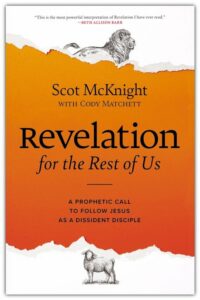 Revelation for the Rest of Us: A Prophetic Call to Follow Jesus as a Dissident Disciple Scot McKnight, with Cody Matchett (Zondervan) $26.99 OUR SALE PRICE = $21.59
Revelation for the Rest of Us: A Prophetic Call to Follow Jesus as a Dissident Disciple Scot McKnight, with Cody Matchett (Zondervan) $26.99 OUR SALE PRICE = $21.59
Whenever Scot McKnight does a new book you know we will have it. Whether it is his heavy scholarly work, his lesser known liturgical spirituality, or his popular new Bible study series, we’ve on it. We so appreciate his work and this new hardback, informed by excellent scholarship but written for ordinary readers, is just the kind of book we love to highlight. It is a bit edgy, politically counter-cultural, altogether serious about being Biblical, and theologically and historically aware. It is deeply inspirational and somewhat practical. And a little funny.
As it says on the back, “How can a book about dragons, lambs, and strange beasts help us follow Jesus today?”
When scholars who love the church and have written important volumes (including on Revelation) like Michael Gorman endorse a book, alongside Lynn Cohick and Miroslav Volf, you know it’s a winner. One reviewer says it is “the most powerful interpretation of Revelation I have ever read” which, while we don’t know how many such books this reviewer has actually read, seems to ring true to me and is quite striking. I’ve read a lot, believe me! Beth Allison Barr says it “reorients us from bizarre prophecies and fiction bestsellers back to the truth of the gospel.”
I’m thrilled just glancing through the footnotes and books cited in this rigorous, broad-minded study. McKnight, a solid evangelical, is fluent in all kinds of research and he here cites feminist scholars like Elisabeth Schussler Fiorenza and black liberationists like Brian Blount and classic evangelicals like Craig Keener. He knows the work of Anabaptist anti-militarists and Presbyterian pastors like Eugene Peterson and, of course, Richard Hays and Michael Gorman and Richard Bauckham, the important work of Adela Yarbro Collins and nearly anyone else who has written responsibly on the apocalypse and being “dissident disciples.” He draws in Barman and reflects on gender stuff, reminds us of the formative importance of worship and he cites, wisely, Christopher Lasch. I didn’t see that coming. What a book.
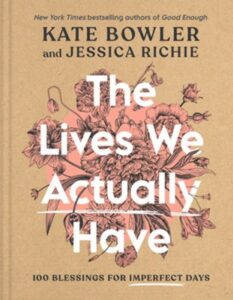 The Lives We Actually Have: 100 Blessings for Imperfect Days Kate Bowler and Jessica Richie (Convergent) $25.00 OUR SALE PRICE = $20.00
The Lives We Actually Have: 100 Blessings for Imperfect Days Kate Bowler and Jessica Richie (Convergent) $25.00 OUR SALE PRICE = $20.00
If you know who Kate Bowler is, you surely know her two extraordinary memoirs Everything Happens for a Reason (And Other Lies I’ve Loved) and No Cure for Being Human (and Other Truths I Need to Hear) Both are very well written, amusing and poignant as she explores her faith and her serious diagnosis with deadly cancer. Following those two bestsellers she joined with Jessica Richie to do a small daily devotional called Good Enough. Ms Richie runs the Everything Happens Project at Duke Divinity School and is the producer of the Everything Happens podcast. This new book is a follow up to their devotional, offering poetic prayers and blessings for a range of struggles in our daily lives.
The wording of these prayer-poem blessings are sometimes elegant but then again, they can be witty and surprising. (“Blessed are you, the strange duck. You with the very intense hobbies… you are a marvel.”)
The theme of the Good Enough devotional was to rest in God’s acceptance, rejecting the cultural pressure to be relentlessly perfect, happy and successful. Here, they wonder what to do if “our actual lives don’t feel very #blessed? They continue, “Might our everyday existence be worthy of blessing, too? Even an average Tuesday?”
Yep. Formatted a bit like a real prayer-book, these are real blessings on the full range of human activities, from garbage days to grief-stricken days, from ordinary stuff to hard stuff. Very, very nice.
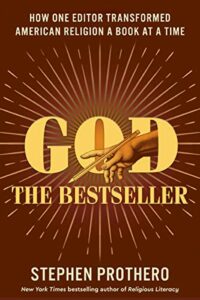 God The Bestseller: How One Editor Transformed American Religion a Book at a Time Stephen Prothero (HarperOne) $32.99 OUR SALE PRICE = $26.39
God The Bestseller: How One Editor Transformed American Religion a Book at a Time Stephen Prothero (HarperOne) $32.99 OUR SALE PRICE = $26.39
Today is the official “street date for God the Bestseller and I just spent time with it last night. I wanted to skim the intro to understand more what the heck could be so important about this biography of one Eugene Exman, a guy most of us, I dare say, have never heard of. Late into the night I was still turning pages, amazing, gulping, stunned almost. What a story.
Prothero is a religion scholar who has done a few very good books showing (in grace and with liberal leanings) that all world religions are not alike, as some scholars in the 20th century have insisted. It’s just goofy implying, say, the Christian notion of heaven or new creation is the same as nirvana or paradise. Like a touchdown is a different thing than a home run, our distinctive matter if we are going to honor different religions as they are actually taught.
In the preface of this book Prothero tells of a serendipitous meeting of an old gent who had a huge library of his father-in-law’s books. Prothero sees first editions of everything from Martin Luther King’s first book (Stride Toward Freedom) with a note inside from Coretta, to other such seminal titles from the 20th century, from Abraham Heschel to Albert Schweitzer to Harry Emerson Fosdick to Aldous Huxley to Howard Thurman to the founder of AA, all with photos and intimate correspondence. Exman seemed to be, like Zelig, in the thick of the major religious questions of the world for decades and decades of the mid-twentieth century, from reforms in Judaism to the popularization of Buddhism to mystics and reformers around the globe.
As a young man in the Roaring Twenties Exman got a job as a new editor in New York for one of the most important publishing companies of our time, eventually Harper Brothers. As Prothero shows, Exman, a former fundamentalist bound for a revivalist seminary, brought religious publishing to the broader reading public at a time when it was largely sectarian and insular. He traveled around the world, meeting people who he thought might have something to say and got them published.
The story of this exciting man’s adventures in the world (and in the world of generally religious publishing) is itself worthy of a biography. Prothero, though, shows the influence — which, doubtlessly, Prothero thinks has been by and large a good thing — that Exman’s actors have had. He brings his sociology of religion lens to the projects and concludes two major things: there has been a shift towards the experiential (rather than the creedal or dogmatic) and there has been a shift towards a celebration of the spiritual seeker.
Exman knew everybody, various folks from various religions, races, genders, sexualities, classes. He knew Niebuhr, the Zen popularizer Alan Watts, AA co-founder Bill Wilson and his wife, Lois. Prothero discovered endearing letters from Jaroslav Pelican, the famous guru Krishnamurti, and Dorothy Day. The books he brought to the world and the remarkable network of friends he collaborated with left its mark, for better or for worse, helping the world engage religious studies in new ways. That Prothero links him to William James (The Varieties of Religious Experience) is no surprise.
As an evangelical thinker and Presbyterian congregant, I have my issues with this whole shift in the zeitgeist, a shift that this remarkable man helped nurture. As a bookseller, I am delighted just to think of how books, for good or ill, can influence the world so very, very much. I’m captivated by stories of those who have been promoters of books and ideas and how those ideas have been adopted, passed on, taught, believed. This is a grave matter, of course, but we know well the rise of “nones” and “spiritual but not religious” believers, so there is nothing to be gained by being snide about it all. Exman must have been an amazing person; his inter-religious mystical bent (even leading him, as a church goer his whole life to experiment with LSD years before Timothy Leary) and fascination with the paranormal charged his impressive intellect with finding authors that shaped the 20th century and beyond. What a story!
TO PLACE AN ORDER
PLEASE READ, THEN SCROLL DOWN AND CLICK ON THE “ORDER HERE” LINK BELOW.
It is very helpful if you tell us how you prefer us to ship your orders.
The weight and destination of your package varies but you can use this as a quick, general guide:
There are generally two kinds of US Mail options, and, of course, UPS. If necessary, we can do overnight and other expedited methods, too. Just ask.
- United States Postal Service has the option called “Media Mail” which is cheapest but can be slow. For one typical book, usually, it’s about $3.85; 2 lbs would be $4.55.
- United States Postal Service has another option called “Priority Mail” which is $8.50, if it fits in a flat rate envelope. Many children’s books and some Bibles are oversized so that might take the next size up which is $9.20. “Priority Mail” gets much more attention than does “Media Mail” and is often just a few days to anywhere in the US.
- UPS Ground is reliable but varies by weight and distance and may take longer than USPS. We’re happy to figure out your options for you once we know what you want.
If you just want to say “cheapest” that is fine. If you are eager and don’t want the slowest method, do say so. It really helps us serve you well so let us know. Just saying “US Mail” isn’t helpful because there are those two methods, one cheaper but slower, one more costly but quicker. Which do you prefer?
– DON’T FORGET TO LET US KNOW WHAT SHIPPING METHOD YOU PREFER –
BookNotes
SPECIAL
DISCOUNT
20% OFF
ALL BOOKS MENTIONED
+++
order here
this takes you to the secure Hearts & Minds order form page
just tell us what you want to order
inquire here
if you have questions or need more information
just ask us what you want to know
Hearts & Minds 234 East Main Street Dallastown PA 17313
read@heartsandmindsbooks.com
717-246-3333
Sadly, we are still closed for in-store browsing. COVID is not fully over. Since few are reporting their illnesses anymore, it is tricky to know the reality but the best measurement is to check the water tables to see the amount of virus in the eco-system. It’s still bad, and worsening (again.) With flu and new stuff spreading, many hospitals are overwhelmed. It’s important to be particularly aware of how risks we take might effect the public good. It is complicated for us, so we are still closed for in-store browsing due to our commitment to public health (and the safety of our family, staff, and customers.) The vaccination rate here in York County is sadly lower than average. Our store is a bit cramped without top-notch ventilation, so we are trying to be wise. Thanks for understanding.
Please, wherever you are, do your best to be sensitive to those who are most at risk. Many of our friends, neighbors, co-workers, congregants, and family members may need to be protected since more than half of Americans (it seems) have medical reasons to worry about longer hazards from even seemingly mild COVID infections.
We are doing our famous curb-side and back yard customer service and can show any number of items to you if you call us from our back parking lot. It’s sort of fun, actually. We are eager to serve and grateful for your patience as we all work to mitigate the pandemic. We are very happy to help do if you are in the area, do stop by.
Of course, we’re happy to ship books anywhere.
We are here 10:00 – 6:00 EST / Monday – Saturday, closed on Sunday.

